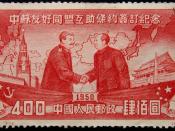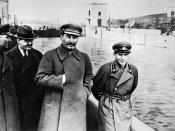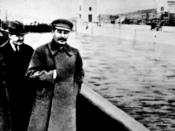Iosif (Joseph) Vissarionovich Stalin, original name Ioseb Jughashvili was a Bolshevik revolutionary, and leader of the Soviet Union. Stalin became general secretary of the Soviet Communist Party in 1922; following the death of Vladimir Lenin, he prevailed over Leon Trotsky in a power struggle during the 1920s and fully consolidated his authority with the Great Purge, a period of severe repression which reached its peak in 1937, remaining in power through World War II and until his death. Stalin molded the features that characterized the new Soviet regime; his policies, based on Marxist-Leninist ideology, are often considered to represent a political and economic system called Stalinism.
Under Stalin, who replaced the New Economic Policy (NEP) of the 1920s with five year plans (introduced in 1928) and collective farming, the Soviet Union was transformed from a peasant society to a major world industrial power by the end of the 1930s. However, Soviet agriculture, which had been exploited to finance the industrialization drive, continued to show poor returns throughout the decade.
Collectivization had met widespread resistance, resulting in a bitter struggle of many peasants against the authorities. Meanwhile, Stalin argued that the ruling Communist Party's factionalism might weaken the Soviet Union in the face of foreign enemies. During the 1930s, he eliminated effective political opposition through a harsh system of internal exile (see Gulag) and executions, and through providing certain segments of the population benefits so as to win their support or co-opt them into the regime.
A hard-won victory in World War II (the Great Patriotic War, 1941-45), made possible in part through the capacity for production that was the outcome of industrialization, laid the groundwork for the formation of the Warsaw Pact and established the USSR as one of the two major world powers, a position it maintained for nearly...


